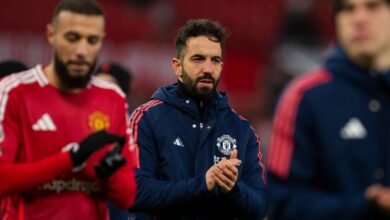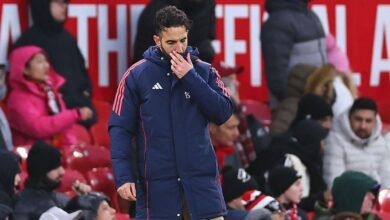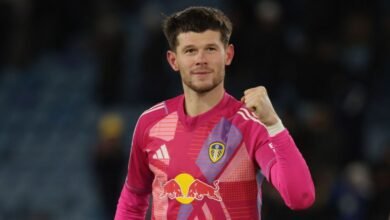Farewell Jesus Navas Spain Sevillas quiet legend retires

It’s the biggest moment in Spanish football history, and it started with Jesús Navas. In the 2010 World Cup final, Spain were tied 0-0 with Netherlands in extra time when Navas — on as a substitute — received the ball, deep in Spain’s half. What he did next sums up Navas as a player, his defining qualities displayed on the grandest stage.
With two, unfussy touches, he beat Rafael van der Vaart and sprinted away down the touchline. Pause the footage here, and it’s almost comical: three defenders — Van der Vaart, Wesley Sneijder and Eljero Elia — are all chasing Navas. None of them get close.
We all know what happened then: Cesc Fàbregas’ pass found Andrés Iniesta, who scored, and Spain won the World Cup. Iniesta got the goal and the glory; Fàbregas got the assist. But the move began with Navas, doing what he does best: running down the wing, faster than anybody else.
Fourteen years later, at last summer’s Euro 2024, there was Navas again. When right-back Dani Carvajal — one of Spain’s tournament MVPs — was suspended, Navas stepped in against France, the oldest outfield player to appear in a Euro or World Cup semifinal.
Facing Kylian Mbappé could have been a nightmare. Instead, Navas overcame a 14th-minute yellow card to perform better than anybody expected, even playing a part in Dani Olmo‘s winning goal. Spain won 2-1 and were into another final.
Navas was the only Spain player to feature at both the 2010 World Cup and Euro 2024. For that alone, he deserves a special place in the hearts of Spanish football fans, and that’s before you mention the four times he won the Europa League with Sevilla, the Premier League title triumph with Manchester City and a host of individual records.
As Navas, 39, prepares to take part in his last LaLiga game before retirement — at Real Madrid on Sunday (stream LIVE at 10:15 a.m. ET on ESPN+ in the U.S.) — ESPN spoke to the player as well as some of the most influential figures in his 20-year career.
“The word that best defines Jesús is ‘elegido‘.”
Pablo Alfaro captained the great Sevilla side of the mid-2000s, and shared a room with Navas when the teenager joined the first team. Elegido literally means “chosen,” but it could equally be translated as “elite” or “the best.”
“It’s his natural qualities, how he’s dealt with his career, the commitment he’s shown,” Alfaro tells ESPN. “Becoming a Spanish football legend, without having played for either of the two biggest teams in Spain [Real Madrid and Barcelona]? That is very, very difficult.”
As he prepares for retirement, Navas’ legendary status is beyond dispute. No Sevilla player has won more trophies at the club than his eight, or played more games. The stadium at Sevilla’s training ground bears his name.
Navas’ arrival in the first team — making his LaLiga debut days after turning 18, in November 2003 — came as the club was heading into the most consistently successful spell in its history.
“I was captain when [Navas] came to do his first preseason,” Alfaro says. “Captain, and roommate. We wanted the younger players to be looked after by the older ones. [He was] a very thin, fragile kid. He didn’t talk much, he was introverted. He had the body of a child, but on the field, he had tremendous strength and speed. He didn’t need to train like the others to be at top speed. He just kept going.”
He adds, with a laughs: “He could eat whatever he wanted. He had to gain weight and muscle, so they let him eat anything! In our room, he kept a bag of sweets on the table. I saw him eating them and I said ‘take that temptation away!”
Joaquin Caparrós — who was Sevilla coach from 2000 to 2005, before returning twice in the 2010s — tells ESPN: “I remember his face, his excitement at wanting to be a footballer, to play for Sevilla.
“He was always eager to go out and train. He enjoyed being on the pitch. He accepted it when the coach didn’t pick him. In this life you reap what you sow. And Jesús has sown a lot. That’s why he’s getting the recognition he’s getting now.”
Those Sevilla teams were thrilling to watch, built on a careful blend of homegrown talent — Navas, his contemporary Sergio Ramos, José Antonio Reyes (two years older), and Antonio Puerta, whose death in August 2007 marked a generation — and smart signings like Frédéric Kanouté, Luis Fabiano, Adriano and Julio Baptista.
The result of that smart management, led by sporting director Monchi, was unprecedented. Sevilla won back-to-back Europa Leagues in 2006 and 2007 and came close to beating Madrid and Barça to the LaLiga title, leading the table for much of 2006-07. But it was also a period in which Navas struggled with anxiety, with chronic homesickness limiting his ability to travel or consider a call-up to the national team.
“I’m a boy from a small town, who came to Sevilla at 15 years old, and within three years I was already making my debut in the first division,” Navas told ESPN’s Martin Ainstein this month. “It’s such a big jump, it’s hard to take in.
“From playing in your town’s team, to a full stadium, the leap into the first team, the first division. It was a difficult situation. But when I went out onto the field, that’s when I was transformed. That was like my cure, it was incredible. That’s when I felt like the happiest man in the world.”
By 2009, the problem was under control to a point where he could play for Spain. He made his international debut in November, at the age of 23. Eight months later, he was part of the team that won the World Cup in South Africa.
“Being a world champion is what you dream of as a kid,” Navas said. “It’s the greatest thing, it’s the best, for a footballer. Playing for my country is the best. Being there in the final, helping your country, helping so many people to enjoy that moment, is unique. It will always be there.”
Navas wasn’t among the leaders of that Spain team, or the side that won Euro 2012 two years later. Competing with players like Iniesta, David Silva, Fàbregas, Pedro and Juan Mata for a place in the starting XI, he was never a guaranteed starter.
“It’s like in the movies,” Alfaro tells ESPN. “There are actors who aren’t stars, but when you think of a movie, or a scene, they always appear. In finals [Navas] appears, creating a goal, playing a pass. Those actors might not be an icon, the great star of the movie or the series, but they’re always working.”
Navas’ international profile grew in 2013, when he joined Manchester City. An impressive first season, winning the Premier League, was followed by diminishing returns (he never added to his first-season tally of four league goals). However, working with Pep Guardiola in 2016-17 was the catalyst for his late-career conversion from winger to full-back.
After four years in England, Navas returned to Sevilla. At a chaotic time for the club — poor results saw six coaches hired and fired in three seasons between 2016 and 2019 — his experience was essential.
“The second time I came back to Sevilla, in a delicate situation, with a lot at stake, [Navas] was very committed to helping out,” Caparrós tells ESPN. “When he was injured, he supported his teammates from the dressing room. Jesús is exactly the same. He has the same face. He’s the same boy who started out. And that says a lot about the human quality of Jesús Navas.”
Under coach Julen Lopetegui, appointed in 2019, Sevilla stabilised and returned to doing what they do best: winning the Europa League. Now established at right-back, Navas captained the team to victory in the 2020 final with a dramatic 3-2 win over favorites Inter Milan.
“It’s very difficult to choose from so many [moments], but I would pick that Europa League that he won as captain,” Alfaro tells ESPN. “He’s the one who lifted the trophy, and then the one two years ago [in 2023] with [José Luis] Mendilibar as coach, as a veteran.”
That last Europa League win, against Roma on penalties, was the epilogue to another challenging season. Sevilla flirted with relegation from LaLiga until Mendilibar took over in March, picking up enough points for a mid-table finish, and beating giants Manchester United, Juventus and Roma in Europe.
The following season in 2023-24 wasn’t much better, with another three coaches — Mendilibar, Diego Alonso and Quique Sánchez Flores — and another relegation battle.
“For me, it’s been very hard,” Navas told ESPN. “I spent the last two years almost not wanting to leave the house. We won the Europa League the first year, but in the league, that was very tough. I feel it a lot. My wife doesn’t understand why I don’t want to go out. It hurts me so much, seeing my Sevilla in that situation. And it’s been like this for two years.”
The team’s difficulties have been coupled with Navas’ growing injury problems, which have restricted his ability to perform. “I’ve had four or five years, with my hip,” Navas told ESPN. “This last year, it’s been terrible. It’s got worse. My desire to continue helping Sevilla, to be with the team during this transition, has made me carry on.
“I control myself a bit in training. But in a match, you have to give it your all: jumping, crossing, duels. When I play a full match, the damage is greater the next day. There’ve been days when I couldn’t walk. I’ve had two episodes of not being able to walk, and with my kids, it’s been difficult. That’s why this last year has been complicated, and that’s why I’m ending it now.”
The club initially mishandled Navas’ contractual situation, forcing their captain to announce that he would be abruptly leaving last summer, before a swift about-turn saw him agree an extension until Dec. 31, 2024.
“I wanted to extend it for these six months,” Navas told ESPN. “I knew that we were coming out of two very difficult years, and I wanted to be there with my teammates, to help them.”
1:20
Why Sevilla legend Jesus Navas is retiring mid-season
Gab Marcotti and Julien Laurens talk about Jesus Navas’ motives for retiring after 16 trophies across Sevilla, Machester City and the Spanish national team including the 2010 World Cup.
On Saturday, Navas played his last game at the Ramón Sánchez Pizjuán. Footage from the team bus ahead of Sevilla’s 1-0 win over Celta Vigo showed Navas crying, before he’d even arrived at the ground. A banner, held up by fans before kickoff, featured two images: one of Navas the boy, and another, the man he has become. He was in tears again as he walked onto the pitch to a guard of honor, accompanied by his children, the trophies he has won awaiting them.
Navas played 70 minutes before a long, drawn-out substitution, with more tears, hugs from teammates and applause from the crowd. Before leaving the pitch, Navas knelt to kiss the turf in the centre circle.
“I’m so happy to have given these trophies to these fans, to Puerta, to Reyes,” told DAZN postmatch, name checking his two friends and teammates, both of whom died young. “We’ve given everything for them.”
Navas will make one last appearance for Sevilla on Sunday at the Santiago Bernabéu, although it’s not yet clear if he’ll start or, more likely, come off the bench. “It will be nice,” Navas told ESPN. “A stadium like the Bernabéu, at such a big club, in the capital of Spain. I still have that game left, and that will be the end.”
His legacy: 20 years of trophies won, records broken, and generations of Sevilla fans who’ve watched him play.
“Jesús Navas is a footballer who’s achieved everything individually,” Caparrós tells ESPN. “He’s a world champion, a European champion. He’s won the biggest trophies with Sevilla. He’s the player who’s played the most games for Sevilla, more than 700. And on a personal level, Jesús is a footballer with really great values. He’s an example for everyone in football.”
His future will remain closely tied to the club, in a yet-to-be-specified role.
“I’m very happy with everything I’ve achieved,” Navas told ESPN. “Not just on the sporting side, but on the human side too: not having changed since my first day. That’s the most beautiful thing, staying the same.
“I think the most important thing is the simplicity I always have. A humility to keep working. I think that’s what has got me here — keeping my feet on the ground.”
Source link



